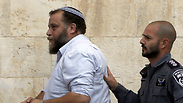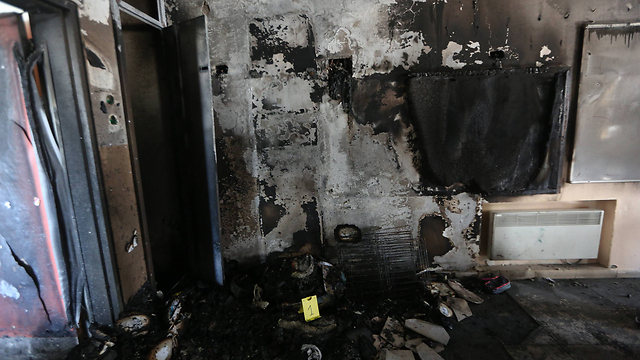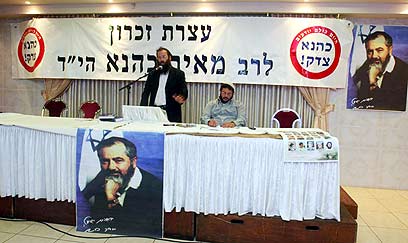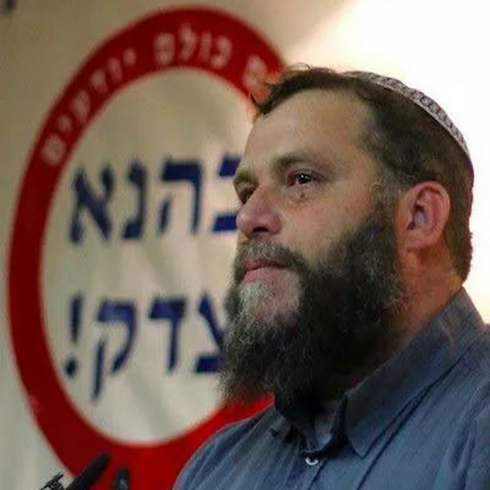
Inside radical right-wing group Lehava
Journalist who spent two and a half months undercover as activist in anti-assimilation organization offers glimpse into group that is putting Israel's democracy to one of its sternest tests in recent years.
Lehava's world came crashing down this morning. Large police forces mounted a pre-dawn raid on the homes of several of the Jewish extremist group's most prominent activists, including chairman Bentzi Gopstein, and took them into custody on suspicion of inciting and calling for acts of violence.
I'm dressed now in a Lehava T-shirt and I'm standing together with a handful of ardent activists and family members of the detainees out the Jerusalem Magistrate's Court. We're surrounded by a host of security personnel and journalists. Armed with whistles and signs that read "Bentzi, an Israeli hero" and the like, we're here to show support for the detainees.
This wasn't how I had intended to spend the day. My plan had been to go to the offices of Otzma Yehudit, the right-wing movement led by Dr. Michael Ben-Ari, to help out there instead. Following the arrest a week earlier of the three Lehava activists on suspicion of torching the Bilingual School in Jerusalem, Gopstein ordered a freeze on Lehava's activities until the storm blew over; meanwhile "everyone's invited to help Otzma Yehudit." But already on the way to Jerusalem something felt wrong; and efforts to contact Lehava activists in the city proved fruitless.
"They were arrested all of a sudden, no one has any contact with them," said one of the activists who eventually responded to my call. "Enough with the blood libels!" cried out the message on Lehava's WhatsApp group. "The media and the police are trying at all costs to depict the organization as racist, as one that is operating illegally; the allegations are absurd."
I join up with Anat Gopstein, Bentzi's wife, and her daughters. "Mother says they banged on the door like animals," one of the daughters says. "The house was upside down. They started looking for clothes in the laundry basket, and took all the Rabbi Kahane material," another daughter adds.
We're surrounded by a large police presence on the ready to swiftly quell any unrest, and the media don't stop taking photographs and trying to speak with the activists. "No interviews, guys, and no friction with the police," we're instructed. "Itamar (Ben-Gvir, the detainees' attorney) told us to video everything."
These instructions were not issued by chance. For months now, the state has been up in arms about Lehava's activities, and the calls to outlaw the organization are getting louder. It appears the organization's activists have never before felt this persecuted.

For me, this wave of arrests marked the culmination of two and a half months as an undercover journalist in Lehava, an extremist right-wing organization that is testing the boundaries between freedom of expression and incitement. I demonstrated against the employment of Arabs and the wanton spilling of Jewish blood; I participated in excursions to prevent assimilation along with activists armed with a knuckleduster and a chain; I was exposed to the cunning methods Lehava uses to dissuade Jewish men and women from having contact with gentiles; I visited the grave of Rabbi Meir Kahane and saw what could be defined as the reawakening of the Kach Movement, which has been declared a terrorist organization; and I saw more and more people around me being arrested every day.
More than anything, however, the months I spent in Lehava offer a glimpse into the organization that is putting Israel's democracy to one of its sternest tests in recent years.
October 23
Lehava activists have just rushed off from the mall in Petah Tikva to a nearby park. A minute earlier, we reported seeing a group of four Arabs with a Jewish girl in the area. "Look at them running," one of the people with me says excitedly. "Wow! They're coming with brass knuckles and chains," adds another activist alongside me. My heart is pumping wildly, adrenaline rushes through me. Am I about to get involved in a fight just two hours after beginning my activity in Lehava?
It turns out the girl isn't Jewish. Following a brief exchange of words, the two groups part ways; and I breathe a sigh of relief.
Apart from having the right ideology, to join Lehava one needs to fill out a form on the organization's website. The volunteers start out as rank-and-file activists, go out on patrols and man information booths on the streets; and some move on later to serve as regional coordinators or admins of WhatsApp groups. Some of the girls are trained to help save other Jewish girls from assimilation.
The WhatsApp groups are the organization's primary communication network and carry reports about mixed couples, messages on behalf of Gopstein and the organization's leadership, and pre-Shabbat words from Rabbi Kahane on the weekly Torah portion. A few days after I hook up with the Petah Tikva branch of the organization, the following message comes through: "Friends, at 20:30 on Thursday there'll be booth at the entrance to the big park opposite the Petah Tikva court. Everyone should come."
Early in the evening I meet the activists' coordinator, Yisrael, an unshaven 20-something-year-old with a skullcap on his head. He looks at me quizzically before explaining that we're not there to get involved in any violent activities. "If someone tries to provoke us, we won't be drawn in," he says, before helping me to find his name on the list of WhatsApp group members. "Here we go, 'Death to the leftists and Arabs,' – that's me."
I get myself a Lehava shirt and listen to Yisrael's briefing along with the other activists, mostly teenagers, and some not even 16 years old. Thereafter, we walk through the park and hand out cards bearing messages such as "Don't even think about getting a Jewish girl" or "He doesn't really love you." The message to every Arab man we meet: "It's fine for you to be here, just don't try to pick up a Jewish girl."
We're instructed to look for mixed couples. And if we find any, we're to approach the woman, acquire her telephone number, and pass it on to the organization for further handling of the matter. "You approach the girl and say, 'Excuse me, I don't have a phone. May I make a call? You call your phone, and that's how you get the number," Gopstein will explain to us at some point.
The same exercise takes place every Thursday. Another day of the week is devoted to patrols around the city, fundraising and the distribution of leaflets.
November 11
The hall in Jerusalem is packed, large wooden boards divide the men from the women, and Rabbi Kahane's angry face appears on the large screens around the room. His calls for the death penalty for terrorists and his labeling of the leftists as traitors and the Arabs a cancer boom from the speakers. The crowd cheers and applauds, and loud jeering is heard at every mention of Shimon Peres' name.

The event comes to mark the 24th anniversary of Kahane's murder and in attendance are activists from Lehava, Otzma Yehudit and other right-wing groups. I'm responsible for selling stickers and collecting names and particulars to add to Lehava's mailing list.
"Do you want to join Lehava?" Have you heard about us?" I say with a wink to a familiar activist I run into. "I heard they are racist, fascists, Arab haters." he responds with a laugh. "Why don't they make stickers that read: I am a racist, a proud fascist? Why do you use that symbol?" he asks, pointing to the stickers. "Just use a swastika and that's it."
Following a brief prayer session, the rally opens with an address by Gopstein. "Some 45 years ago, Rabbi Kahane said, shouted and cried out that the enemies within us are a cancer and that if we don't take this cancer and get rid of it, we won't continue to exist," Gopstein begins. "Unfortunately, this dangerous cancer of coexistence has metastasized everywhere. There are various ministers in the government who are encouraging coexistence, who are giving them jobs, allowing them into the hi-tech world, allowing them to become doctors,"
The audience responds with loud boos and jeering. "Everyone knows today that Rabbi Kahane was right," he continues, "but knowing is not enough. The rabbi wanted action and so we haven't gathered here only to remember Rabbi Kahane; we are here to continue Rabbi Kahane's way."
Gopstein's speech now reaches a climax: "The cancer we spoke about in the beginning has offshoots in the Knesset of Israel too," he says. "Thirty years ago, Rabbi Kahane stood up in the Knesset and took out a hangman's noose for traitors, a noose for the Arab MK who was there. It's not a threat, it's a promise, the rabbi said when attacked for doing so. So this is what I want to wish (former MK Azmi) Bishara on behalf of all of you," and Gopstein pulls out a noose and waves it to the crowd. "Your day will come, Azmi! We are waiting for the Israeli government to come and hang you from the tallest tree! Azmi, only thanks to Rabbi Kahane will we make sure you are hanged one day."
Gopstein leaves the stage to calls of "Bentzi! Bentzi!" And Ben-Gvir takes the microphone. "Let's hear it for him; he deserves it," the attorney calls out.
November 13
I meet the man of mystery at the memorial service for Rabbi Kahane. "You know," he confesses to me, "the first thing I did today, exactly 24 years after Rabbi Kahane's murder, was to put on teffilin. I'm a religious man thanks to him."
I've wanted to meet for a long time. He's in his 40s, has a light-colored beard and a large skullcap on his head, and he's wearing a waistcoat with colorful patterns over his white shirt. The Lehava activists call him The Magician.
The Magician, or Rabbi Aryeh Lar by his real name, is one of the most admired people in the organization, the brains behind the struggle against assimilation. He's been in the business now for 20 years, lectures about the dangers of assimilation at educational institutions and in the community, and meets for talks with Jewish girls who are dating Arabs. Earlier efforts to learn more about the man had fallen short, and here he was now, standing right in front of me.
"Where are you from? What are you studying?" he asks.
When I tell him I'm a student, his eyes open wide. "Tell me, can you act? Pretend? You need to know how to talk to some of them."
The conversation continues, and Lar reveals some of his trade secrets. "We first need to gather as much information about them as we can, and then we go over to speak to them in a random fashion," he says of the girls with whom he meets. "You don't mention the word, gentile. You say that you see some impurity in her that could affect her health, her life; perhaps it's a relationship, maybe something else – and that's how you get to her.
"We've already saved more than 200 girls in four years," Lar continues. "Some require two years of hard work. Most of the girls don't want to talk at all… Take my number and if I have names from the center of the country, I'll get in touch with you."
Two days later, I get my first call for help; but the friends of the "errant" girl who called in the report get cold feet when I approach them as a representative of Lehava. I don't get to "save" her, but my ties with The Magician strengthen, and we now speak almost daily. He tells me about the cases he is working on – a girl from Petah Tikva one time, another from Bnei Brak, and another from Jerusalem, and more.
November 18
It's the day of the terror attack at the synagogue in Jerusalem's Har Nof neighborhood and I'm attending a highly charged demonstration in the city at which loud calls for revenge are ringing out from all directions.
This is not the first time I am exposed to the friction between the Lehava activists and the security forces. "Almost every single Lehava activist has been interrogated at some point by the Shin Bet security service, and almost everyone is being monitored, especially the principal activists," I was told once by Dikla, the organization's volunteer coordinator at the time, during a demonstration in Jerusalem the day after the attempted assassination of Yehuda Glick.
More and more protesters assemble, and the mood heightens. The slogans on the lips of the demonstrators are racist and hateful: "Death to the Arabs," "Shuafat's on fire," "Muhammad is dead," "Jews – revenge," "Gaza is a graveyard."
Standing close by to me is Michael Ben-Ari. "We are dealing with a bloodthirsty enemy, with a nation of murderers," he yells into a megaphone, and then signs off with a quote from Kahane: "There is no coexistence with them!" The worked-up crowd responds in kind: "There is no coexistence with cancer!"
December 21
"Rabbi Aryeh's been arrested!" read the WhatsApp message I received this morning. This is the second wave of arrests involving Lehava. A few days earlier, 10 of the organization's activists, including Gopstein, were taken into police custody. The law enforcement officials appear determined to leave no stone unturned.
Meanwhile, Lehava's WhatsApp groups remain silent. The only activities publicized are those of Otzma Yehudit, and the Lehava activists are being urged to lend a hand.
"Yes, I was arrested yesterday, bless God. I'm a terrorist, a danger to the public," Lar says to me when I can finally catch up with him the following day. His words come with an uncharacteristic cynical tone.
"They're asking me if I have threatened Arabs. Do you understand? It's not like that have any information," he says. "I've never seen such stupidity. It's incredible... If they had anything, they wouldn't have taken me in for questioning and would have jailed me for a day or two."
I inform him that Gopstein is under house arrest. "He'll be released on Wednesday, and then what?" he responds. "We'll carry on as usual."
Gopstein in response: Lehava does not operate in an illegal manner. "We do not act violently and do not operate in an illegal manner," Gopstein said in response to an approach from us. "I know that we don't intimidate or use brass knuckles and iron chains. And there's no chanting of 'Death to the Arabs' at our demonstrations either. And if there were, I put an end to it. We are against such calls. The courts that deliberated the police's claims in the wake of the arrests of the Lehava activists rejected them, and ruled that the fight against assimilation is not racism. All the activists and I were released."












